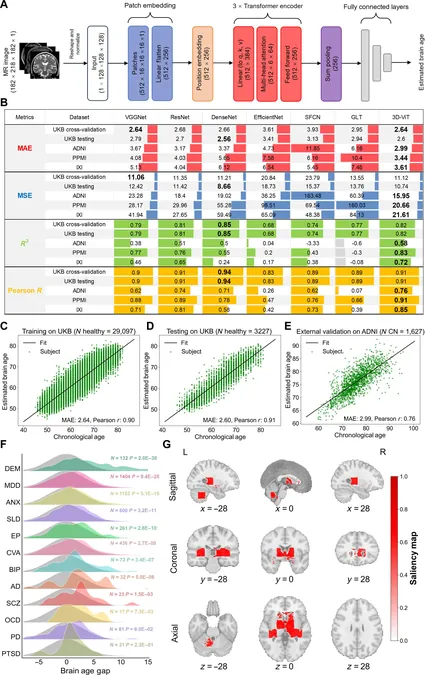
Revolutionary Deep Learning Study Reveals Gene Targets and Possible Drugs to Combat Brain Aging!
2025-03-16
Author: Ming
Introduction
In an exciting new study published in Science Advances, researchers have unveiled groundbreaking insights into the genetic factors influencing brain aging by harnessing the power of deep learning algorithms. By analyzing MRI data from the extensive UK Biobank, they successfully identified seven key genes responsible for accelerated biological brain aging, alongside 13 existing medications that could potentially target these genes to slow this process.
The Importance of Delaying Brain Aging
As we age, the delicate balance of our brain health shifts, leading to an increased risk of neurodegenerative diseases and cognitive decline. The implications of delaying the aging process are staggering; it is estimated that even a mere 2% delay could yield a staggering $7.1 trillion in healthcare savings over the next few decades. Thus, understanding what drives brain aging is not just a curiosity but a vital aspect of enhancing overall human longevity.
Understanding the Brain Age Gap (BAG)
One important metric in brain health research is the "brain age gap" (BAG), which contrasts an individual's estimated biological brain age with their chronological age based on MRI and other diagnostic methods. A significant BAG is often indicative of underlying brain disorders such as Alzheimer's, schizophrenia, and other degenerative conditions and correlates with decreased cognitive performance.
The Study Details
While the BAG has been thoroughly studied, the genetic and environmental factors that contribute to brain aging have remained somewhat elusive. This recent study aimed to shed light on this matter through sophisticated deep learning models, trained on data from nearly 39,000 participants, which averaged 64 years old and included equal gender representation.
Key Findings: Genes and Therapeutics
The study revealed seven pivotal genes: MAPT, TNFSF12, GZMB, SIRPB1, GNLY, NMB, and C1RL, which hold promise as targets in the quest to mitigate brain aging. The researchers employed a novel 3D-ViT (Vision Transformer) model that accurately predicted biological brain age by examining critical MRI signatures. Special techniques, including saliency map analysis, highlighted vital brain regions that are essential for determining brain age, notably identifying areas like the lentiform nucleus—crucial for cognitive functions—and the posterior limb of the internal capsule, linking many brain structures to our brain's outer layer, which governs memory, thinking, and learning.
Repurposing Existing Drugs
The intriguing part? By merging their findings on genetic targets and brain regions associated with aging, the researchers compiled a list of 13 drugs and supplements—including hydrocortisone, testosterone, diclofenac, and metformin—that are already available and could potentially be repurposed to combat the decline of brain health.
Conclusion and Future Directions
While this study marks a significant leap forward in our understanding of the genetic basis of aging, the researchers stress caution. They emphasize the need for further studies across various demographics to validate these findings and ensure they hold true for broader populations.
This promising research not only opens doors to new therapeutic avenues to slow down brain aging but also serves as a call to action for continued exploration in the field of longevity. The quest to enhance our brain health and extend our cognitive abilities has never been more crucial! Keep your eyes peeled for what might come next in this revolutionary field.





 Brasil (PT)
Brasil (PT)
 Canada (EN)
Canada (EN)
 Chile (ES)
Chile (ES)
 Česko (CS)
Česko (CS)
 대한민국 (KO)
대한민국 (KO)
 España (ES)
España (ES)
 France (FR)
France (FR)
 Hong Kong (EN)
Hong Kong (EN)
 Italia (IT)
Italia (IT)
 日本 (JA)
日本 (JA)
 Magyarország (HU)
Magyarország (HU)
 Norge (NO)
Norge (NO)
 Polska (PL)
Polska (PL)
 Schweiz (DE)
Schweiz (DE)
 Singapore (EN)
Singapore (EN)
 Sverige (SV)
Sverige (SV)
 Suomi (FI)
Suomi (FI)
 Türkiye (TR)
Türkiye (TR)
 الإمارات العربية المتحدة (AR)
الإمارات العربية المتحدة (AR)